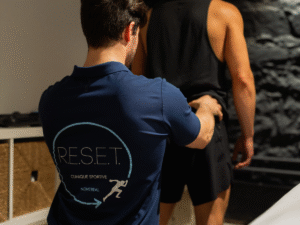Overtraining is defined as reduced performance and prolonged fatigue. This syndrome occurs when an athlete trains too intensively and/or too frequently, and is unable to manage recovery phases
The symptoms and intensity of overtraining may vary from athlete to athlete, but the most typical are :
- Reduced performanc
- Muscle and joint pain
- Fatigue, lack of energy and exhaustion
- Sleep disorders
- Stress and anxiety
- High blood pressure
- Weakened immune system
There are a number of ways to avoid overtrainin
1) Periodization of training
Plan your sessions, start and restart your workouts progressively (load and/or intensity).
2) Consult a kinesiologist to assess your physical condition and create an appropriate training plan.
3) Favour the "Training for pleasure" vs. the "Performance" approac
4) Don’t neglect the recovery phase
Always listen to your body to avoid injury. Recovery phases can involve good sleep, diet, hydration and light physical activity (such as walking or stretching). In addition, manual therapy sessions such as physiotherapy, osteopathy or sports massage will be beneficial for better recovery.
For more information, come and see our therapists at the RESET Clinic



